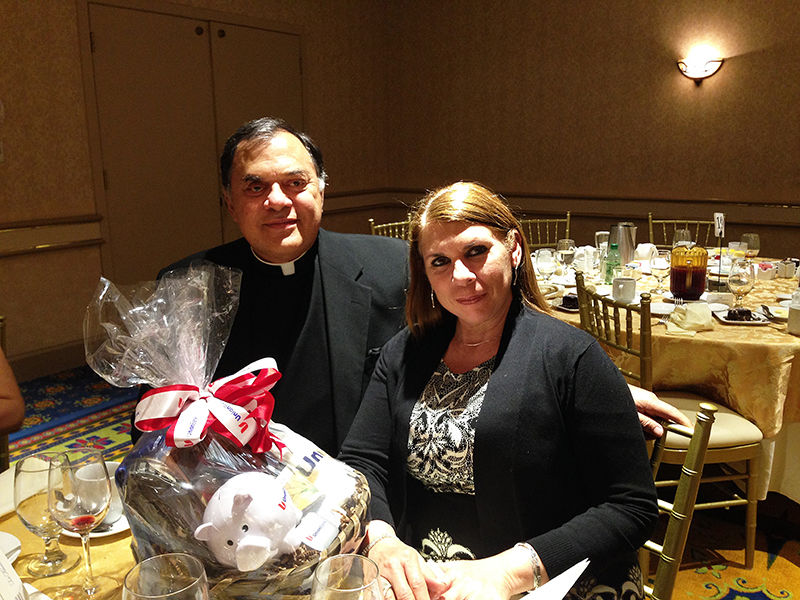After 35 years with diabetes, Father David Mateo Velazquez was left with a failed kidney that required three two-hour sessions of dialysis each week to keep the blood-purifying organ functioning. Despite two years of the grueling procedure, the pastor at St. Joseph Church in Carpinteria wasn’t seeing any health improvements.
At 65 years of age, the procedure was more of a drain on his health.
“Each time I was finished, I was very tired,” Father Velazquez told The Tidings. “Some people don’t have that reaction, but for me it was very difficult. Sometimes I lost eight pounds after a session.” He had little appetite and had difficulty performing his priestly duties.
For a while his sister, Patricia Velazquez, 57, who works as a registered nurse in Mexico, tried to convince her brother to get a kidney transplant. She offered to donate her own, but he was hesitant because he thought it might hurt his sister’s health. “I was very worried because I had no education about it,” he says.
But after his sister assured him that the donation, although a time-consuming procedure, would not endanger her health, he agreed to speak to doctors at Cedars-Sinai Medical Center in Los Angeles.
On March 11, following a yearlong waiting period to ensure that the priest was in the right physical condition and after having undergoing many tests to ensure that he was a good candidate and that his sister was in good health, Father Velazquez and his sister went for the operation that would give the a second chance at life.
Weeks after the procedure, Father Velazquez reports he is enjoying life. “It’s been seven weeks since our transplant, and we are in very good health. I am very active, very positive. The change is incredible.”
He spent a month in quarantine following the procedure to prevent infection — nursed at a convent. He will also have to be careful for the next three months to avoid even a cold, which could be dangerous for his condition, meaning that he will have to forgo public places and saying Mass.
Medication to ensure that his body does not reject the transplant will be an everyday ritual, but he is grateful to his sister for her willingness to help and for educating him about the life-saving benefits of a transplant.
Proper education is necessary to save lives, he says. “We need to learn that organ donation is a hopeful gift of life for other people. It is a miracle.”
He adds, “We need to educate people about the real opportunities.”
He notes that many people aren’t as lucky as he was. Many die while waiting for an organ donor. In the U.S. alone, more than 84,000 men, women and children are waiting for an organ transplant. On average, 22 people die each day waiting for a transplant because of the organ donor shortage, according to the U.S. Government Information on Organ and Tissue Donation and Transplantation.
According to Father Velazquez, organ donations are only moral when they do not adversely affect the health of the individual who is donating.
“For example that you can’t donate your cornea since it will affect your sight, but you can donate a kidney since you can live with one kidney,” he explains. “Or you can donate a piece of your liver.”
St. John Paul II spoke of organ donation as a beautiful act that reaffirms the culture of life. In his 1995 encyclical Evangelium Vitae, he wrote that organ donation is good when “performed in an ethically acceptable manner, with a view to offering a chance of health and even of life itself to the sick who sometimes have no other hope.”
The Ethical and Religious Directives for Catholic Health Care Services (ERDs) notes that in order to avoid a conflict of interest only a competent medical authority, and not a member of the transplant team, should be responsible for the organ donation of a vital organ. In the case of a heart donation, for example, a third-party doctor would have to declare the donor dead before the transplant could proceed.
St. John Paul II was very clear that a person could only be declared dead by medical doctors and scientists, while the scientific community defined the term “dead” as the end of spontaneous cardiac and respiratory functioning and the irreversible cessation of all functioning of the brain, including the brain stem. He spoke on this topic in 2000 at the International Conference of Organ Transplant Specialists.
“The Church invites all Christians and believers to donate,” says Father Velazquez. “Donations are an opportunity of life for other people.”

